Gina Harris's Blog, page 93
September 3, 2018
Thoughts on Crazy Rich Asians
We saw Crazy Rich Asians Saturday and really enjoyed it.
This doesn't undo any criticism of the film. People have made good points, but part of that has involved noticing things that I didn't notice, largely due to different life experiences.
The thing that made more of an impression on me was the reason that I did not originally plan on seeing it, which is that I am not a huge fan of conspicuous consumption. I heard about the movie not long after I had seen the video of a woman in Singaport - Jamie Chua - and her closet and clothes:
https://www.youtube.com/watch?v=wcikVAADwak
So I know there is crazy money there, but I find that kind of thing revolting, even though Chua herself seems fairly sweet. I ended up going to the movie primarily to support diversity in casting, because Crazy Rich Asians gives memorable parts to a lot of people who probably have a hard time getting considered for film roles here, and also because people said it was good.
And it was good. I liked it a lot, but because of the human parts. While it does show a lot of purchased fabulousness, the movie really doesn't love the money, though it does have a lot of fun with it.
I am going to go more into that tomorrow, while writing about another movie I saw, a documentary called Generation Wealth. Before the documentary, I saw a preview for another film The Hate U Give, which also played before Crazy Rich Asians.
The first time I saw the preview, all I could feel was the pain of the shooting. On the second time, I focused more on Starr talking about being a different person at home and at school - and hating it. That combined for me with this movie, where sometimes authenticity took a back seat to connections or family obligations or the weight of wealth.
There was also a subplot where one marriage was suffering from the strain of different resources and backgrounds.
Anyway, I am sure I could have many other thoughts on the movie, but the thing that came out the strongest was an absolute desire to only ever have to be me, honestly, and that no money or relationship could be worth losing that. It shouldn't be necessary for those things to conflict, but it can happen.
My deeper thoughts are balancing individuality and collectivism (more from a philosophical than an economic point of view), and my more immediate thoughts are about imbalances in fame (and money, in anyone can ever come up with some), but the screaming thought is honesty over all, and I need to be me.
This doesn't undo any criticism of the film. People have made good points, but part of that has involved noticing things that I didn't notice, largely due to different life experiences.
The thing that made more of an impression on me was the reason that I did not originally plan on seeing it, which is that I am not a huge fan of conspicuous consumption. I heard about the movie not long after I had seen the video of a woman in Singaport - Jamie Chua - and her closet and clothes:
https://www.youtube.com/watch?v=wcikVAADwak
So I know there is crazy money there, but I find that kind of thing revolting, even though Chua herself seems fairly sweet. I ended up going to the movie primarily to support diversity in casting, because Crazy Rich Asians gives memorable parts to a lot of people who probably have a hard time getting considered for film roles here, and also because people said it was good.
And it was good. I liked it a lot, but because of the human parts. While it does show a lot of purchased fabulousness, the movie really doesn't love the money, though it does have a lot of fun with it.
I am going to go more into that tomorrow, while writing about another movie I saw, a documentary called Generation Wealth. Before the documentary, I saw a preview for another film The Hate U Give, which also played before Crazy Rich Asians.
The first time I saw the preview, all I could feel was the pain of the shooting. On the second time, I focused more on Starr talking about being a different person at home and at school - and hating it. That combined for me with this movie, where sometimes authenticity took a back seat to connections or family obligations or the weight of wealth.
There was also a subplot where one marriage was suffering from the strain of different resources and backgrounds.
Anyway, I am sure I could have many other thoughts on the movie, but the thing that came out the strongest was an absolute desire to only ever have to be me, honestly, and that no money or relationship could be worth losing that. It shouldn't be necessary for those things to conflict, but it can happen.
My deeper thoughts are balancing individuality and collectivism (more from a philosophical than an economic point of view), and my more immediate thoughts are about imbalances in fame (and money, in anyone can ever come up with some), but the screaming thought is honesty over all, and I need to be me.
Published on September 03, 2018 17:51
August 31, 2018
Concert Review: The Ataris
No matter how enjoyable Signal Vs. Noise and Icarus The Owl were, the main attraction was The Ataris. They were at Dante's on a tour celebrating the 15th anniversary of So Long, Astoria. The crowd was full of people who were thrilled to be there. It is a pretty good album.
 I don't want that to take away from a pretty good overall catalog, including the more recent Welcome to the Night (especially "Whatever Lies Will Help You Rest"). Still, with So Long, Astoria and its own theme of nostalgia, looking back on that is kind of looking back on everything. That made for a strong emotional connection.
I don't want that to take away from a pretty good overall catalog, including the more recent Welcome to the Night (especially "Whatever Lies Will Help You Rest"). Still, with So Long, Astoria and its own theme of nostalgia, looking back on that is kind of looking back on everything. That made for a strong emotional connection.
 The band did a good job of it, and they did that in the face of difficulties. While drummer Dustin Phillips has been working with singer Kris Roe - the driving force behind The Ataris - since 2016, Mike Doherty on guitar and Danny LaFlamme on bass were new this tour. They fit in well and you couldn't tell, unless you had looked at recent pictures of the band and noticed that way.
The band did a good job of it, and they did that in the face of difficulties. While drummer Dustin Phillips has been working with singer Kris Roe - the driving force behind The Ataris - since 2016, Mike Doherty on guitar and Danny LaFlamme on bass were new this tour. They fit in well and you couldn't tell, unless you had looked at recent pictures of the band and noticed that way.
 In addition, wildfire smoke and diminished air quality had been exacerbating breathing issues for Roe. He sang through lung inflammation, but at this point the last two dates have been postponed while he recovers from pneumonia. Lots of singers will point at the audience to sing some parts, but this is the first time I remember being thanked for singing along, and he had good reason. (Note: climate change affects everything.)
In addition, wildfire smoke and diminished air quality had been exacerbating breathing issues for Roe. He sang through lung inflammation, but at this point the last two dates have been postponed while he recovers from pneumonia. Lots of singers will point at the audience to sing some parts, but this is the first time I remember being thanked for singing along, and he had good reason. (Note: climate change affects everything.)
 I am happy to say it did not kill their sense of fun. Here Roe and Phillips get some double drums going, not quite Adam Ant style, but it was a nice touch.
I am happy to say it did not kill their sense of fun. Here Roe and Phillips get some double drums going, not quite Adam Ant style, but it was a nice touch.
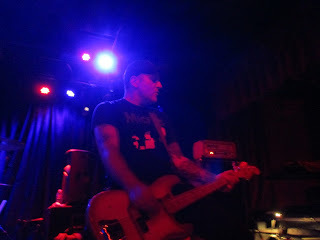 I loved LaFlamme's playing style. The speed and dexterity reminded me Daniel Andriano, but with a little bit of Alex Levine magnetism. There were technique things that I don't even know how to describe, but here's the part that was funny for me: on the start of "The Boys of Summer", that blurring of hands suddenly stopped. It was a drastic change. Then I suddenly remembered a friend of mine describing a Don Henley performance on Saturday Night Live of "All She Wants To Do Is Dance" and mentioning the bass player having almost nothing to do, but trying to act like it was more. Apparently Don Henley uses simple bass lines; got it!
I loved LaFlamme's playing style. The speed and dexterity reminded me Daniel Andriano, but with a little bit of Alex Levine magnetism. There were technique things that I don't even know how to describe, but here's the part that was funny for me: on the start of "The Boys of Summer", that blurring of hands suddenly stopped. It was a drastic change. Then I suddenly remembered a friend of mine describing a Don Henley performance on Saturday Night Live of "All She Wants To Do Is Dance" and mentioning the bass player having almost nothing to do, but trying to act like it was more. Apparently Don Henley uses simple bass lines; got it!
Later in the song it switched up again. That could have well been Ataris-specific embellishment, which led to another thought. They use a lot of feedback, but that night I noticed that it can blend pretty well with jangle. It occurred to me then that The Ataris could do a great cover of "Kiss Me". It's not likely, because New Found Glory has already covered that, but I maintain that if The Ataris did, it would sound good.
https://www.facebook.com/theataris
https://bandcamp.com/theataris
https://www.youtube.com/user/TheAtarisVEVO/featured
https://twitter.com/theataris
 I don't want that to take away from a pretty good overall catalog, including the more recent Welcome to the Night (especially "Whatever Lies Will Help You Rest"). Still, with So Long, Astoria and its own theme of nostalgia, looking back on that is kind of looking back on everything. That made for a strong emotional connection.
I don't want that to take away from a pretty good overall catalog, including the more recent Welcome to the Night (especially "Whatever Lies Will Help You Rest"). Still, with So Long, Astoria and its own theme of nostalgia, looking back on that is kind of looking back on everything. That made for a strong emotional connection. The band did a good job of it, and they did that in the face of difficulties. While drummer Dustin Phillips has been working with singer Kris Roe - the driving force behind The Ataris - since 2016, Mike Doherty on guitar and Danny LaFlamme on bass were new this tour. They fit in well and you couldn't tell, unless you had looked at recent pictures of the band and noticed that way.
The band did a good job of it, and they did that in the face of difficulties. While drummer Dustin Phillips has been working with singer Kris Roe - the driving force behind The Ataris - since 2016, Mike Doherty on guitar and Danny LaFlamme on bass were new this tour. They fit in well and you couldn't tell, unless you had looked at recent pictures of the band and noticed that way. In addition, wildfire smoke and diminished air quality had been exacerbating breathing issues for Roe. He sang through lung inflammation, but at this point the last two dates have been postponed while he recovers from pneumonia. Lots of singers will point at the audience to sing some parts, but this is the first time I remember being thanked for singing along, and he had good reason. (Note: climate change affects everything.)
In addition, wildfire smoke and diminished air quality had been exacerbating breathing issues for Roe. He sang through lung inflammation, but at this point the last two dates have been postponed while he recovers from pneumonia. Lots of singers will point at the audience to sing some parts, but this is the first time I remember being thanked for singing along, and he had good reason. (Note: climate change affects everything.) I am happy to say it did not kill their sense of fun. Here Roe and Phillips get some double drums going, not quite Adam Ant style, but it was a nice touch.
I am happy to say it did not kill their sense of fun. Here Roe and Phillips get some double drums going, not quite Adam Ant style, but it was a nice touch. I loved LaFlamme's playing style. The speed and dexterity reminded me Daniel Andriano, but with a little bit of Alex Levine magnetism. There were technique things that I don't even know how to describe, but here's the part that was funny for me: on the start of "The Boys of Summer", that blurring of hands suddenly stopped. It was a drastic change. Then I suddenly remembered a friend of mine describing a Don Henley performance on Saturday Night Live of "All She Wants To Do Is Dance" and mentioning the bass player having almost nothing to do, but trying to act like it was more. Apparently Don Henley uses simple bass lines; got it!
I loved LaFlamme's playing style. The speed and dexterity reminded me Daniel Andriano, but with a little bit of Alex Levine magnetism. There were technique things that I don't even know how to describe, but here's the part that was funny for me: on the start of "The Boys of Summer", that blurring of hands suddenly stopped. It was a drastic change. Then I suddenly remembered a friend of mine describing a Don Henley performance on Saturday Night Live of "All She Wants To Do Is Dance" and mentioning the bass player having almost nothing to do, but trying to act like it was more. Apparently Don Henley uses simple bass lines; got it!Later in the song it switched up again. That could have well been Ataris-specific embellishment, which led to another thought. They use a lot of feedback, but that night I noticed that it can blend pretty well with jangle. It occurred to me then that The Ataris could do a great cover of "Kiss Me". It's not likely, because New Found Glory has already covered that, but I maintain that if The Ataris did, it would sound good.
https://www.facebook.com/theataris
https://bandcamp.com/theataris
https://www.youtube.com/user/TheAtarisVEVO/featured
https://twitter.com/theataris
Published on August 31, 2018 06:33
August 30, 2018
Concert Review: Icarus The Owl
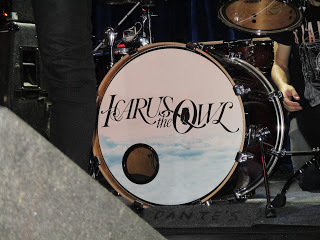 Icarus The Owl was the second band on the lineup last Thursday at Dante's.
Icarus The Owl was the second band on the lineup last Thursday at Dante's.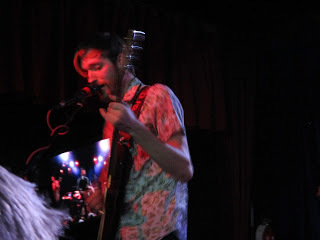 They are a local indie band.
They are a local indie band. The lead singer was so unfailingly polite that when he mentioned playing hockey as a child I figured they were Canadian and it all made sense. Still, people in Portland are generally pretty polite.
The lead singer was so unfailingly polite that when he mentioned playing hockey as a child I figured they were Canadian and it all made sense. Still, people in Portland are generally pretty polite. There is a plaintive urgency to their songs. More recently they remind me of Household, but I can imagine fans of Jets to Brazil and Jeremy Enigk enjoying Icarus The Owl.
There is a plaintive urgency to their songs. More recently they remind me of Household, but I can imagine fans of Jets to Brazil and Jeremy Enigk enjoying Icarus The Owl. That is not just for the angst, but also an intellectual heft to the angst, that cares about aliens and orcas.
That is not just for the angst, but also an intellectual heft to the angst, that cares about aliens and orcas.Yeah, they're pretty Portland.
https://www.facebook.com/Icarustheowl/
https://www.youtube.com/user/Icarustheowl
https://twitter.com/Icarustheowl
Published on August 30, 2018 16:09
August 29, 2018
Concert Review: Signal Vs. Noise
 Signal Vs. Noise is a Portland band that I got to see last week at Dante's.
Signal Vs. Noise is a Portland band that I got to see last week at Dante's.
Their set was brief but filled with good energy and fun.
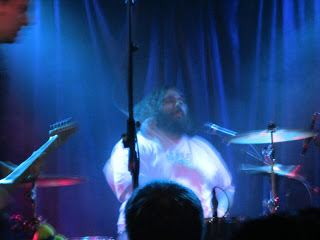 They did well from the stage, but vocalist Mark Schmidt also bravely ventured into the audience. I thought it was well-received, though based on the photo it looks like some people near the stage may not have noticed.
They did well from the stage, but vocalist Mark Schmidt also bravely ventured into the audience. I thought it was well-received, though based on the photo it looks like some people near the stage may not have noticed.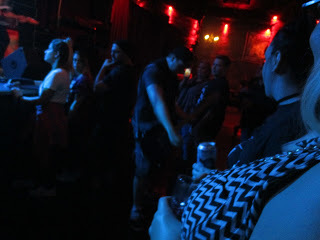 Favorite songs have been "Nineteen" and "Highways and Hillside Estates" but their 2018 self-titled album works well overall. They are definitely worth a listen.
Favorite songs have been "Nineteen" and "Highways and Hillside Estates" but their 2018 self-titled album works well overall. They are definitely worth a listen. Just for clarification, they previously performed under the name The Starship Renegade. This is them.
Just for clarification, they previously performed under the name The Starship Renegade. This is them.https://www.facebook.com/signalversusnoise/
https://signalvsnoise.bandcamp.com/releases
https://shop.spreadshirt.com/signal-versus-noise
https://www.youtube.com/user/thestarshiprenegade
https://twitter.com/SignalVsWorld
Published on August 29, 2018 17:03
August 28, 2018
Once more in the dystopian present
About six years ago, when I first finished the 400+ page fan fiction, I wrote a post about the pre-apocalyptic dystopian present, because even though I was working with a future situation and things were much worse, there were still too many things that seemed real.
That was totally appropriate; speculative fiction should tell us about ourselves. If that means it is often full of warnings, that is a reflection on ourselves. You could find that in the work of many authors. In the case of Octavia Butler, there were lots of warnings in Parable of the Sower, and it feels like we ignored the warnings for too long.
There is a changing climate, a rise of religious extremism, dangerous drug use that can lead to violence, and politicians campaigning on making America great again and picking fights with Canada. Some of those things are more from the sequel, Parable of the Talents, but they build upon each other in a reasonable way.
It is also not that surprising that the projections would seem familiar. When I read Margaret Atwood's The Handmaid's Tale I remember reading that there was no individual concept that hadn't happened somewhere. Putting them all together makes a work of fiction, but the fiction is working with facts.
It is not surprising that Butler could predict a future campaign slogan because a similar one was used in the past. On a related note, I recently learned that "Drain the swamp" came from Mussolini. It turns out that fascist authoritarianism doesn't require a lot of creativity.
In Sower, economic issues and growing violence were making it really hard for people to live and live safely, so there were companies recruiting families to go live in their communities as employees. They would have room and board, and maybe a salary if they were lucky. Yes, that sounds like at least serfdom or share-cropping if not outright slavery, but I was reading the book in February. In March I was reading about Miami-Dade county coming up with a plan to house teachers in the school because they couldn't afford area rents:
https://www.miamiherald.com/news/local/community/miami-dade/article206839799.html
I shouldn't have been surprised by it. I've heard many conservatives justify why there is no specific work that automatically deserves a living wage, regardless of whether it requires education or serves the public good, but does anyone really think this is good for teachers? When your place to live depends not merely on having some income, but on the entity you work for, how secure is anything?
Sower also had people who break into neighborhoods and kill the residents as a means of helping the poor, which sounds pretty alt-left, but I don't want to go over everything and what resonated. Really, there are just two points that I want to make.
One is that in the past when we projected into these scary scenarios - in books and movies and music videos - we always called it post-apocalyptic because we believed it would take some major disruption to bring us to this feral state. That no longer appears to be true. Slow, steady attacks on education, unions, news, and integration have been the most effective weapons, and shame on us for not seeing it.
The other thought is my frustration that it could be too late. I keep finding all of these methods that could be so good for building a better world, but they need to be built onto a functional world, not this dumpster fire we're creating. It's basic Maslow's hierarchy of needs, you know; how can you move toward self-actualization when it's a struggle just to survive?
And it doesn't mean that I've quit trying or studying, but also there is rage, and mourning, and frustration, and maybe some stockpiling if I can manage it. But we keep choosing hate over beauty, and there is no good place for that to go.
Related post:
http://sporkful.blogspot.com/2012/10/here-in-pre-apocalyptic-dystopian.html
That was totally appropriate; speculative fiction should tell us about ourselves. If that means it is often full of warnings, that is a reflection on ourselves. You could find that in the work of many authors. In the case of Octavia Butler, there were lots of warnings in Parable of the Sower, and it feels like we ignored the warnings for too long.
There is a changing climate, a rise of religious extremism, dangerous drug use that can lead to violence, and politicians campaigning on making America great again and picking fights with Canada. Some of those things are more from the sequel, Parable of the Talents, but they build upon each other in a reasonable way.
It is also not that surprising that the projections would seem familiar. When I read Margaret Atwood's The Handmaid's Tale I remember reading that there was no individual concept that hadn't happened somewhere. Putting them all together makes a work of fiction, but the fiction is working with facts.
It is not surprising that Butler could predict a future campaign slogan because a similar one was used in the past. On a related note, I recently learned that "Drain the swamp" came from Mussolini. It turns out that fascist authoritarianism doesn't require a lot of creativity.
In Sower, economic issues and growing violence were making it really hard for people to live and live safely, so there were companies recruiting families to go live in their communities as employees. They would have room and board, and maybe a salary if they were lucky. Yes, that sounds like at least serfdom or share-cropping if not outright slavery, but I was reading the book in February. In March I was reading about Miami-Dade county coming up with a plan to house teachers in the school because they couldn't afford area rents:
https://www.miamiherald.com/news/local/community/miami-dade/article206839799.html
I shouldn't have been surprised by it. I've heard many conservatives justify why there is no specific work that automatically deserves a living wage, regardless of whether it requires education or serves the public good, but does anyone really think this is good for teachers? When your place to live depends not merely on having some income, but on the entity you work for, how secure is anything?
Sower also had people who break into neighborhoods and kill the residents as a means of helping the poor, which sounds pretty alt-left, but I don't want to go over everything and what resonated. Really, there are just two points that I want to make.
One is that in the past when we projected into these scary scenarios - in books and movies and music videos - we always called it post-apocalyptic because we believed it would take some major disruption to bring us to this feral state. That no longer appears to be true. Slow, steady attacks on education, unions, news, and integration have been the most effective weapons, and shame on us for not seeing it.
The other thought is my frustration that it could be too late. I keep finding all of these methods that could be so good for building a better world, but they need to be built onto a functional world, not this dumpster fire we're creating. It's basic Maslow's hierarchy of needs, you know; how can you move toward self-actualization when it's a struggle just to survive?
And it doesn't mean that I've quit trying or studying, but also there is rage, and mourning, and frustration, and maybe some stockpiling if I can manage it. But we keep choosing hate over beauty, and there is no good place for that to go.
Related post:
http://sporkful.blogspot.com/2012/10/here-in-pre-apocalyptic-dystopian.html
Published on August 28, 2018 14:52
August 27, 2018
Thinking of the children
I'd heard many good things about Octavia Butler, so wanted to read at least something by her. The Parable of the Sower seemed like a reasonable starting place.
I really didn't intend to read any more, at least not for that Black History month 2018, but then it sounded so real that I ended up checking out its sequel, The Parable of the Talents too.
It is hard to put into words. I guess to some extent, when I recognized situations that were real, and predicted, I hoped that the sequel might have some good methods for dealing with the situations. I hoped there might be ways to get around it.
I will write more about that tomorrow, but the strongest thing in the sequel for me was the effect of separating parents and children.
There are some spoilers coming.
Lauren's child was taken from her, and given up for adoption. Early in The Parable of the Talents you know that Lauren has died, and her child is going through her papers and trying to understand her. As much as you can wish them both well, Asha's interpretation always involves a feeling of being of secondary importance to her mother.
It never felt right to me. It meant reading her mother's writings and not believing the words. It meant that even when they were finally reunited there was a barrier between them, and Asha would not accept her mother's love.
It just so happened that I was reading the book about a month after we had started learning about immigrant children being taken from their parents and the irreparable harm it was doing.
There were many justifications for the separation in the book. It first happened because of religious extremists, because the parents were evil cult members. They weren't really, but that's how they were labeled, and that made stealing their children and property and forcing the adults into slavery, including rape, okay.
Then Lauren's brother learned where her child was, but because he was also against her religion (and probably because the group had hurt his pride, without him ever admitting to himself that was it), he kept the information to himself. He later forged a relationship with his niece, but lied to her about her parents. In the end learning the truth did not set her free, because she couldn't believe the truth.
There are still 528 children separated from their families. There are others who have been reunited, but the trauma is going to affect them for a long time. They may be feeling those effects for the rest of their lives.
It is evil. It comes from letting the worst impulses loose in our country. And as awful as it is that it happened, we should at least be diligently working to fix it as soon as possible.
Here is one starting place: https://actionnetwork.org/groups/raices-refugee-and-immigrant-center-for-education-and-legal-services
I really didn't intend to read any more, at least not for that Black History month 2018, but then it sounded so real that I ended up checking out its sequel, The Parable of the Talents too.
It is hard to put into words. I guess to some extent, when I recognized situations that were real, and predicted, I hoped that the sequel might have some good methods for dealing with the situations. I hoped there might be ways to get around it.
I will write more about that tomorrow, but the strongest thing in the sequel for me was the effect of separating parents and children.
There are some spoilers coming.
Lauren's child was taken from her, and given up for adoption. Early in The Parable of the Talents you know that Lauren has died, and her child is going through her papers and trying to understand her. As much as you can wish them both well, Asha's interpretation always involves a feeling of being of secondary importance to her mother.
It never felt right to me. It meant reading her mother's writings and not believing the words. It meant that even when they were finally reunited there was a barrier between them, and Asha would not accept her mother's love.
It just so happened that I was reading the book about a month after we had started learning about immigrant children being taken from their parents and the irreparable harm it was doing.
There were many justifications for the separation in the book. It first happened because of religious extremists, because the parents were evil cult members. They weren't really, but that's how they were labeled, and that made stealing their children and property and forcing the adults into slavery, including rape, okay.
Then Lauren's brother learned where her child was, but because he was also against her religion (and probably because the group had hurt his pride, without him ever admitting to himself that was it), he kept the information to himself. He later forged a relationship with his niece, but lied to her about her parents. In the end learning the truth did not set her free, because she couldn't believe the truth.
There are still 528 children separated from their families. There are others who have been reunited, but the trauma is going to affect them for a long time. They may be feeling those effects for the rest of their lives.
It is evil. It comes from letting the worst impulses loose in our country. And as awful as it is that it happened, we should at least be diligently working to fix it as soon as possible.
Here is one starting place: https://actionnetwork.org/groups/raices-refugee-and-immigrant-center-for-education-and-legal-services
Published on August 27, 2018 16:38
August 24, 2018
Band Review: The Memphis Murder Men
I decided to check out The Memphis Murder Men after seeing that Misfit Mandy (@AcsGarza) had seen them recently. They are a rock and roll band based in Oakland but started in Pittsburgh, and you can reasonably call them punkabilly.
With at least some songs named after horror movies, and a combination of horror lyrics with old-fashioned music, it was hard not to think of the Misfits. However, they sound like they were influenced more by Elvis Presley than doo-wop. There is less of the soaring vocals of heartbreak, and more rocking guitar. That being said, they sound like they are having a better time than many doo-wop bands.
Listening to them has been very fun. As you listen harder, some of the lyrics become more questionable. Even though it does not sound like it is meant to be taken seriously, it can be uncomfortable.
(This is also a great deal like Misfits for me. Many songs are twisted, but the only one I can't get behind is "One Last Caress". For The Memphis Murder Men, that is "Girls Cant Say No". And maybe "Mister Fister".)
Nonetheless, there is a great deal of fun to be had, although I was left with one burning question. They call themselves "The World's 2nd Greatest Rock n Roll Band". I'm okay with that, but it makes me feel like I should know who's first, and I'm not sure.
I guess existential dread and feelings of uncertainty are a part of horror.
http://thememphismurdermen.net/
https://www.facebook.com/tmmmofficialpage
https://www.youtube.com/channel/UCR9-c9olXstbgzpJ2bAf0hw
https://twitter.com/MurderMenRnR
ETA: The band quickly responded that the 1st greatest band is the Ramones. No arguments here.
With at least some songs named after horror movies, and a combination of horror lyrics with old-fashioned music, it was hard not to think of the Misfits. However, they sound like they were influenced more by Elvis Presley than doo-wop. There is less of the soaring vocals of heartbreak, and more rocking guitar. That being said, they sound like they are having a better time than many doo-wop bands.
Listening to them has been very fun. As you listen harder, some of the lyrics become more questionable. Even though it does not sound like it is meant to be taken seriously, it can be uncomfortable.
(This is also a great deal like Misfits for me. Many songs are twisted, but the only one I can't get behind is "One Last Caress". For The Memphis Murder Men, that is "Girls Cant Say No". And maybe "Mister Fister".)
Nonetheless, there is a great deal of fun to be had, although I was left with one burning question. They call themselves "The World's 2nd Greatest Rock n Roll Band". I'm okay with that, but it makes me feel like I should know who's first, and I'm not sure.
I guess existential dread and feelings of uncertainty are a part of horror.
http://thememphismurdermen.net/
https://www.facebook.com/tmmmofficialpage
https://www.youtube.com/channel/UCR9-c9olXstbgzpJ2bAf0hw
https://twitter.com/MurderMenRnR
ETA: The band quickly responded that the 1st greatest band is the Ramones. No arguments here.
Published on August 24, 2018 17:08
August 23, 2018
Band Review: Murder On The Airwaves
Some of my favorite band reviews have been when bands from Manchester follow me, so I think I lucked out in being followed by Murder On The Airwaves.
Most of the songs are very fast and energetic - very punk - but there are songs that go more slowly and more emotionally. That was the case with "Never Gonna Be Alone" and "Ultraviolet" (Oddly, the song with "Ballad" in the title was not particularly slow.)
Still, I probably found "The Calldown" most interesting. It feels like it goes more places, with more of a journey. Murder On The Airwaves is fun overall, but they are more than fun too.
It looks like their events are pretty scattered, so if you get an opportunity to see them live, take it. Otherwise it could be several months.
https://www.facebook.com/OfficialMOTAuk/
https://www.youtube.com/channel/UC8VEk7N9-r4FI9uj-C6Budw
https://twitter.com/officialmotauk
Most of the songs are very fast and energetic - very punk - but there are songs that go more slowly and more emotionally. That was the case with "Never Gonna Be Alone" and "Ultraviolet" (Oddly, the song with "Ballad" in the title was not particularly slow.)
Still, I probably found "The Calldown" most interesting. It feels like it goes more places, with more of a journey. Murder On The Airwaves is fun overall, but they are more than fun too.
It looks like their events are pretty scattered, so if you get an opportunity to see them live, take it. Otherwise it could be several months.
https://www.facebook.com/OfficialMOTAuk/
https://www.youtube.com/channel/UC8VEk7N9-r4FI9uj-C6Budw
https://twitter.com/officialmotauk
Published on August 23, 2018 17:07
August 22, 2018
The last straws
The movement to ban plastic straws was wrong in so many ways that it becomes interesting, as well as infuriating.
I know about the straw in the sea turtle's nose. I am not a fan of that. However, it was repeated many times that straws are only responsible for .03 percent of plastic waste, while fishing nets make up over forty percent of that waste. You know all those inspiring videos of divers freeing whales and beach goers freeing a giant manta ray from nets? Those happen because not only is that the bulk of the waste, but because by design it is something that entangles ocean life. No one has gotten excited about nets. I suppose it's because no celebrities have.
(There are people working on it. Here's one story: https://news.nationalgeographic.com/2018/06/heather-koldeway-explorer-nets-plastic-philippines-ocean-culture/
I really have nothing against celebrities promoting causes. Any influence you have should be used for good. To really do good, though, advance thought can really elevate the whole thing.
I have one friend who keeps a collapsible reusable straw with her, and specifies not wanting a straw when she orders drinks. She does not need any ban to do that. Lots of people who care deeply about that could do that without a ban.
Of course, that doesn't do anything about plastic cups and lids. Interestingly, drinking carbonated beverages through a straw limits the negative impact on teeth (probably the only reason my sisters still have theirs). There could be a lot to be said health-wise about limiting going to places that use plastic containers (often fast food places) and drinking pop, but okay, if we are not changing that, limiting straw use is one step toward a .03 percent decrease in plastic waste in the oceans.
I am still not against any of that, until the consensus becomes that not enough people will participate voluntarily (probably true), and so we need to make it mandatory (more questionable), and that effort ignores the voices of people with disabilities who say they need straws.
I know to some extent our lack of imagination on disabilities makes things worse; we picture a person in a wheelchair who has unencumbered use of their hands and throat and lungs and surely they don't rely on that straw. But any limited mobility could affect the ability to move the cup, various conditions affecting swallowing can also be a factor, and liquid intake matters. Lots of things can come into play.
For example, if your immune system is compromised, the reusable straws don't just need to be sort of clean. Assuming the dishwasher works, how many straws do you need to have between loads? One person I am thinking of who would not have been able to drink without a straw would have also had a hard time opening up and inserting the a reusable straw. Sometimes there is someone to help, but that's not guaranteed. Paper straws don't hold up well in hot beverages, but they also may not do well when spending a longer time in the beverage, which could be an issue for someone needing to drink slowly.
Okay, previously, I never thought about a straw as a life-saving necessity. You can call that able-bodied privilege; I haven't experienced it and I don't have to think about it. I only even know anything about it now because of seeing other people talking about it. I learned a lot by listening.
The sad part then becomes the passionate reluctance that so many others showed to listening. They were so sure that their solutions for a problem they never thought about were adequate. They were so skeptical about the possibility of there being needs other than their own. Then it is hard to know whether it is more infuriating that people can be so dismissive of the lived experience of others, or that they are doing it for an only .03 percent reduction in waste. I love turtles, but doesn't it make more sense to think bigger?
Except that the idea that caught fire was something that primarily hurts a marginalized group, whereas the ideas that would be more effective would involve asking businesses to do things differently, so really there was no chance it was going to go any other way.
(There are some things worth thinking about in there.)
So I want to go back to those last thoughts from yesterday's post. Imagine being told by someone that they would kill themselves if they had your life. Imagine the state saying that you can't have the pain meds that work for you, but assisted suicide is legal. Added on that, imagine people wanting to take away something that allows you to survive in order to make a tiny dent in a problem, but you are the one who's unreasonable.
One of the other things I saw in that thread about the suicide compliments (for lack of a better term), was someone who works in customer service, but they are in a chair due to a disability. Recently some customers were really nasty about it, but more common are the "friendly" jokes about sitting down on the job. All the time.
Forget whether you have anyone that you care about that has a disability. Forget whether age, disease, or injury will at some point change that. Is this good enough? Is this a way to treat people?
And if you can't care about other people, how much do you really care about the Earth?
I know about the straw in the sea turtle's nose. I am not a fan of that. However, it was repeated many times that straws are only responsible for .03 percent of plastic waste, while fishing nets make up over forty percent of that waste. You know all those inspiring videos of divers freeing whales and beach goers freeing a giant manta ray from nets? Those happen because not only is that the bulk of the waste, but because by design it is something that entangles ocean life. No one has gotten excited about nets. I suppose it's because no celebrities have.
(There are people working on it. Here's one story: https://news.nationalgeographic.com/2018/06/heather-koldeway-explorer-nets-plastic-philippines-ocean-culture/
I really have nothing against celebrities promoting causes. Any influence you have should be used for good. To really do good, though, advance thought can really elevate the whole thing.
I have one friend who keeps a collapsible reusable straw with her, and specifies not wanting a straw when she orders drinks. She does not need any ban to do that. Lots of people who care deeply about that could do that without a ban.
Of course, that doesn't do anything about plastic cups and lids. Interestingly, drinking carbonated beverages through a straw limits the negative impact on teeth (probably the only reason my sisters still have theirs). There could be a lot to be said health-wise about limiting going to places that use plastic containers (often fast food places) and drinking pop, but okay, if we are not changing that, limiting straw use is one step toward a .03 percent decrease in plastic waste in the oceans.
I am still not against any of that, until the consensus becomes that not enough people will participate voluntarily (probably true), and so we need to make it mandatory (more questionable), and that effort ignores the voices of people with disabilities who say they need straws.
I know to some extent our lack of imagination on disabilities makes things worse; we picture a person in a wheelchair who has unencumbered use of their hands and throat and lungs and surely they don't rely on that straw. But any limited mobility could affect the ability to move the cup, various conditions affecting swallowing can also be a factor, and liquid intake matters. Lots of things can come into play.
For example, if your immune system is compromised, the reusable straws don't just need to be sort of clean. Assuming the dishwasher works, how many straws do you need to have between loads? One person I am thinking of who would not have been able to drink without a straw would have also had a hard time opening up and inserting the a reusable straw. Sometimes there is someone to help, but that's not guaranteed. Paper straws don't hold up well in hot beverages, but they also may not do well when spending a longer time in the beverage, which could be an issue for someone needing to drink slowly.
Okay, previously, I never thought about a straw as a life-saving necessity. You can call that able-bodied privilege; I haven't experienced it and I don't have to think about it. I only even know anything about it now because of seeing other people talking about it. I learned a lot by listening.
The sad part then becomes the passionate reluctance that so many others showed to listening. They were so sure that their solutions for a problem they never thought about were adequate. They were so skeptical about the possibility of there being needs other than their own. Then it is hard to know whether it is more infuriating that people can be so dismissive of the lived experience of others, or that they are doing it for an only .03 percent reduction in waste. I love turtles, but doesn't it make more sense to think bigger?
Except that the idea that caught fire was something that primarily hurts a marginalized group, whereas the ideas that would be more effective would involve asking businesses to do things differently, so really there was no chance it was going to go any other way.
(There are some things worth thinking about in there.)
So I want to go back to those last thoughts from yesterday's post. Imagine being told by someone that they would kill themselves if they had your life. Imagine the state saying that you can't have the pain meds that work for you, but assisted suicide is legal. Added on that, imagine people wanting to take away something that allows you to survive in order to make a tiny dent in a problem, but you are the one who's unreasonable.
One of the other things I saw in that thread about the suicide compliments (for lack of a better term), was someone who works in customer service, but they are in a chair due to a disability. Recently some customers were really nasty about it, but more common are the "friendly" jokes about sitting down on the job. All the time.
Forget whether you have anyone that you care about that has a disability. Forget whether age, disease, or injury will at some point change that. Is this good enough? Is this a way to treat people?
And if you can't care about other people, how much do you really care about the Earth?
Published on August 22, 2018 15:31
August 21, 2018
The Shape of Water and representation
My main impression from The Shape of Water was that it didn't deserve Best Picture.
There were things that were really good about it. There were some amazing visuals and great performances, especially Michael Shannon's, but a lot of those elements did not fit together well, which meant that the overall viewing was jarring. Having only seen Hellboy for other examples of Del Toro's work, I would have to guess that he might have some issues with taste and self-indulgence that may hamper him despite having some visionary brilliance. (Kind of a George Lucas situation.)
Despite that, it was also jarring to read articles critical of the movie's portrayal of Elisa, who is mute. Here is one article that links to some of the others I have read:
https://www.huffingtonpost.com/entry/shape-of-water-offensive-to-people-with-disabilities_us_5a8b798de4b0a1d0e12c48fc
My initial quibbling disagreement is that her scars being a remnant of a violent act is an assumption. With her being found as an infant near a river, with the scars and inability to speak already in place, I thought it implied that she was also originally aquatic, and going off with the Amphibian Man was rediscovering her heritage. I base that on what I know of Pan's Labyrinth and the fairy tale tone set in most of the movie, including Giles referring to "the princess" in his narration.
So while I did not in any way think that was the intent or purpose of the movie, that did not automatically negate what people who actually live with disabilities took from the movie, including a confirmation that they need to go off and be with their own kind because there is not a place for them in this world. That was not right, and it was the kind of situation where you can't help but feel like having a few consultants with that actual disability could have been really helpful.
I found that despite thinking I kind of disagreed with the criticisms (it appears I was not that firmly rooted in my disagreement), I suddenly kept finding examples of disability being used as a prop.
The conversation around Natalie Dormer and In Darkness may have been part of it - one could find many examples - but the one I am going to focus on is the recent Portland Opera production of Faust.
I don't know who - for this version - first came up with the idea of putting Marguerite on crutches, but I ended up really hating it.
If the actress had actually needed crutches I would have applauded it. If it had been something that made me look at the character of Marguerite differently, resulting in new ways of thinking about the opera, I could have been pleasantly surprised by that. It was nothing like that.
This was how they used it: during one musical section she briefly did not need to use her crutches. I suppose the idea was to give an extra reason for how giddy Faust's love made her, and to remind the audience that he had infernal powers. It didn't feel that way though; it just felt weird. The reasons to be suspicious of Faust are the jewels and ways in which he presses boundaries. They showed that so beautifully in the 90s.
It also showed a difference in that when her spirit went free (because her body was executed) she no longer needed the crutches. Also done much better in the 90s. And I think there was one more reason for the crutches: to make her situation more pitiable. That was really uncomfortable.
Some of this may seem like it doesn't matter that much, but there are real people with real disabilities. If media finds that to be a fun concept for experimentation, without looking at the reality of situations, that is highly irresponsible. That has real-world consequences. If most of what you know comes from media depictions and they are false, what you think you know about those real people is false.
I am going to share two things I have read recently. I regret not being able to point to who said them. If I can find them later I will add the information.
One was in a recent thread on things that get said to people with disabilities. A frequent comment - paraphrased - is "I would kill myself if I had to go through that."
That may sound like a compliment, because you are so much stronger for being able to deal with it. Another interpretation is "I would not find a life like yours worth living."
On a related note, there was a different thread on the opioid crisis. One reaction to it is severely limiting and trying to completely phase out certain drugs that are addictive, but are also a real help for people with chronic pain. That includes some things they are looking at in Oregon. If our state policy is going to be taking away remedies for pain but leaving suicide available, what are we saying about some lives? That may not be the intended message, but you can send very damaging unintended messages when you don't think things through.
We are living in a time when Nazis are back. Some of them are openly Nazis, some of them are repeating slogans that they have to know relate, but I also hear people echoing things that Hitler wrote with no idea. ("We aren't intended to get along with each other" being a big one.)
Certainly, people who aren't deeply evil should be able to follow those nihilistic trains of thought and see the logical outcomes, be repelled, and reverse, but if you silence enough voices - not even thinking about it - it's possible to make it pretty far down the path.
I reiterate that representation matters. Yesterday and today are about disability representation, other times it will be about gender, race, religion -- humans find a lot of ways to marginalize and hate, and we need to get better than this. Sometimes we are horrible in remarkably stupid and pointless ways.
More on that tomorrow. For now, this seems relevant:
https://www.ushmm.org/information/exhibitions/online-exhibitions/special-focus/nazi-persecution-of-the-disabled
There were things that were really good about it. There were some amazing visuals and great performances, especially Michael Shannon's, but a lot of those elements did not fit together well, which meant that the overall viewing was jarring. Having only seen Hellboy for other examples of Del Toro's work, I would have to guess that he might have some issues with taste and self-indulgence that may hamper him despite having some visionary brilliance. (Kind of a George Lucas situation.)
Despite that, it was also jarring to read articles critical of the movie's portrayal of Elisa, who is mute. Here is one article that links to some of the others I have read:
https://www.huffingtonpost.com/entry/shape-of-water-offensive-to-people-with-disabilities_us_5a8b798de4b0a1d0e12c48fc
My initial quibbling disagreement is that her scars being a remnant of a violent act is an assumption. With her being found as an infant near a river, with the scars and inability to speak already in place, I thought it implied that she was also originally aquatic, and going off with the Amphibian Man was rediscovering her heritage. I base that on what I know of Pan's Labyrinth and the fairy tale tone set in most of the movie, including Giles referring to "the princess" in his narration.
So while I did not in any way think that was the intent or purpose of the movie, that did not automatically negate what people who actually live with disabilities took from the movie, including a confirmation that they need to go off and be with their own kind because there is not a place for them in this world. That was not right, and it was the kind of situation where you can't help but feel like having a few consultants with that actual disability could have been really helpful.
I found that despite thinking I kind of disagreed with the criticisms (it appears I was not that firmly rooted in my disagreement), I suddenly kept finding examples of disability being used as a prop.
The conversation around Natalie Dormer and In Darkness may have been part of it - one could find many examples - but the one I am going to focus on is the recent Portland Opera production of Faust.
I don't know who - for this version - first came up with the idea of putting Marguerite on crutches, but I ended up really hating it.
If the actress had actually needed crutches I would have applauded it. If it had been something that made me look at the character of Marguerite differently, resulting in new ways of thinking about the opera, I could have been pleasantly surprised by that. It was nothing like that.
This was how they used it: during one musical section she briefly did not need to use her crutches. I suppose the idea was to give an extra reason for how giddy Faust's love made her, and to remind the audience that he had infernal powers. It didn't feel that way though; it just felt weird. The reasons to be suspicious of Faust are the jewels and ways in which he presses boundaries. They showed that so beautifully in the 90s.
It also showed a difference in that when her spirit went free (because her body was executed) she no longer needed the crutches. Also done much better in the 90s. And I think there was one more reason for the crutches: to make her situation more pitiable. That was really uncomfortable.
Some of this may seem like it doesn't matter that much, but there are real people with real disabilities. If media finds that to be a fun concept for experimentation, without looking at the reality of situations, that is highly irresponsible. That has real-world consequences. If most of what you know comes from media depictions and they are false, what you think you know about those real people is false.
I am going to share two things I have read recently. I regret not being able to point to who said them. If I can find them later I will add the information.
One was in a recent thread on things that get said to people with disabilities. A frequent comment - paraphrased - is "I would kill myself if I had to go through that."
That may sound like a compliment, because you are so much stronger for being able to deal with it. Another interpretation is "I would not find a life like yours worth living."
On a related note, there was a different thread on the opioid crisis. One reaction to it is severely limiting and trying to completely phase out certain drugs that are addictive, but are also a real help for people with chronic pain. That includes some things they are looking at in Oregon. If our state policy is going to be taking away remedies for pain but leaving suicide available, what are we saying about some lives? That may not be the intended message, but you can send very damaging unintended messages when you don't think things through.
We are living in a time when Nazis are back. Some of them are openly Nazis, some of them are repeating slogans that they have to know relate, but I also hear people echoing things that Hitler wrote with no idea. ("We aren't intended to get along with each other" being a big one.)
Certainly, people who aren't deeply evil should be able to follow those nihilistic trains of thought and see the logical outcomes, be repelled, and reverse, but if you silence enough voices - not even thinking about it - it's possible to make it pretty far down the path.
I reiterate that representation matters. Yesterday and today are about disability representation, other times it will be about gender, race, religion -- humans find a lot of ways to marginalize and hate, and we need to get better than this. Sometimes we are horrible in remarkably stupid and pointless ways.
More on that tomorrow. For now, this seems relevant:
https://www.ushmm.org/information/exhibitions/online-exhibitions/special-focus/nazi-persecution-of-the-disabled
Published on August 21, 2018 14:53



